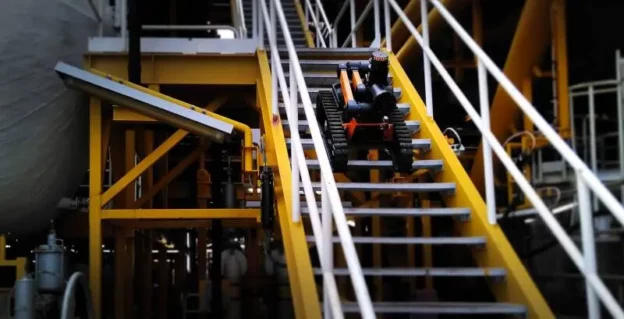Inspenet, November 7, 2023.
TotalEnergies is engaged in its most ambitious pilot project to date, which aims to demonstrate that ground robots play a critical role in the vision of eliminating the need for human workers in large production facilities.
This project involves the participation of two robots located in the floating production, storage and offloading unit (FPSO) Pazflor, located at a distance of more than 90 miles from the coast of Angola and with a capacity of 220,000 barrels per day (B/ D). This comes three years after TotalEnergies began its first large-scale trials with track-equipped robots, which have the ability to climb grating stairs and recharge at docking stations designed specifically for hazardous work environments.
It should be noted that these two robots have been sent to the FPSO Pazflor with the purpose of carrying out routine inspections in two oil separation modules that cover five decks. TotalEnergies’ forecast is that these machines will be capable of carrying out 96% of the inspection tasks that are normally carried out semi-annually.
More details of the TotalEnergies pilot project
More information and specifications of the project were recently revealed. The breadth of reach and workspace provided for the robots marks a “substantial change” compared to previous robotic applications carried out by TotalEnergies.
” Until 2022, the scope of activities of a robot deployed during a pilot was done manually, by defining a few dozen points of interest and preparing it manually in the system ,” the authors state.
In contrast, the robots operating at Pazflor have been assigned a workload that includes around 1,700 points of interest, which is considered a daunting task for human operators. For this reason, TotalEnergies has turned to maintenance analysis software to establish the operating range of the robots for the first time.
A significant novelty in this project is the use of a separate software called “Robot Supervision System” (RSS) to manage most of the robots’ daily activities. This software, developed collaboratively by TotalEnergies and its technology partner Kalypso, a subsidiary of Rockwell Automation, leverages video game engine technology to autonomously plan inspection missions and transmit data to human operators in the control room. However, the central elements of this project remain the robots themselves.
The Taurob robot, backed by TotalEnergies, Equinor, Petrobras and the UK’s Net Zero Technology Centre, has been unveiled as the world’s first “maritime work-grade robot”. These tracked robots are equipped with high-definition cameras, audio recording capabilities, thermal imaging, and 3D LIDAR technology for navigation.
Additionally, they will be used to test new machine learning algorithms developed by TotalEnergies, specifically designed to carry out inspections of valves, gears and lighting. To ensure reliable communication with robots in all areas of the floating production, storage and offloading unit (FPSO), the French oil company has implemented a dedicated private 4G network.
Don’t miss any of our posts and follow us on social media!
Inspenet: https://inspenet.com/
YouTube: https://www.youtube.com/@inspenet
LinkedIn: https://www.linkedin.com/company/inspenetnetwork
Facebook: https://www.facebook.com/inspenetnetwork
Instagram: https://www.instagram.com/inspenet/
Source and photo: https://jpt.spe.org/totalenergies-most-complex-robot-pilot-underway-offshore-angola

